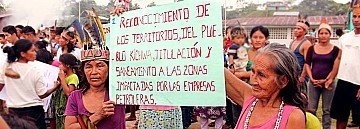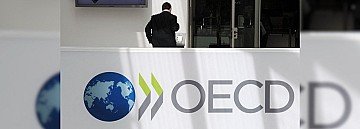- The International Federation for Human Rights (FIDH), together with its member organisations in Peru have submitted an advocacy note to the Organisation for Economic Co-operation and Development (OECD), detailing gaps in governance, corruption and human rights that expose Peru’s shortcomings on its path to the OECD.
- Since 2016, Peru has been mired in a deep political and institutional crisis, which continues to this day. The signatory organisations denounce a national context marked by setbacks to labour and environmental rights.
- The recent attack on the judiciary and the approval of the anti-NGO law are the most recent examples of the drift against the rule of law, civil society and international cooperation.
Paris and Lima, 25 March 2025. The International Federation for Human Rights (FIDH) together with its member organisations in Peru -Asociación Pro Derechos Humanos (APRODEH) and Peru EQUIDAD-, the Civil Society Platform on Business and Human Rights in Peru, and OECD Watch, have submitted an advocacy note to the Organisation for Economic Co-operation and Development (OECD) to express their concerns about Peru’s accession process to the organisation. The note requests that the OECD condition Peru’s accession to the organisation on meaningful, prompt and timely compliance with each of the recommendations made in the note.
"The OECD accession process represents a unique opportunity to strengthen Peru’s democratic institutions and guarantee respect for human, labour and environmental rights at a time when the country is standing in a gray zone between democracy and authoritarianism. In a context of global democratic backsliding, it is essential that the OECD firmly maintains these values and principles", said Gloria Cano, Director of Asociación Pro Derechos Humanos (APRODEH).
The document highlights serious shortcomings in compliance with OECD standards, practices, and core values in key areas such as public governance, rule of law, protection of human and labour rights, anti-corruption, and environmental protection. These shortcomings must be remedied for Peru to aspire to join this select forum of developed economies.
Since 2016, Peru has been mired in a deep political and institutional crisis, which continues to this day. This crisis also responds to structural patterns of discrimination, racism and social exclusion of large vulnerable sectors of the population. These trends were evidenced in the violence and institutional repression that followed the seizure of power by the current ruling coalition -led by Dina Boluarte- in December 2022. The repression resulted in the excessive use of police force, which left 67 people dead. FIDH and APRODEH have requested the International Criminal Court to open an investigation for crimes against humanity for 49 of these assassinations.
In addition, the labour rights situation in Peru remains critical. Strategic sectors such as mining and agro-exports have been particularly affected, with workers facing exploitative working conditions, lack of social security, and systematic obstacles to collective bargaining. Likewise, environmental degradation represents another significant challenge. The oil spill off the Peruvian coast in 2022, reported by FIDH and its member organisations, is just one example of the rampant impunity, lack of commitment to environmental justice by the State and the lack of accountability regarding businesses.
Peru is in a gray zone between democracy and authoritarianism, far from the ideal of democracy professed by the OECD. The OECD promotes essential values and priorities such as the preservation of individual freedom, democracy, rule of law, protection of human rights, gender equality and environmental sustainability.
The Coordinator of Peru EQUIDAD, Enrique Fernandez Maldonado, states that "the Peruvian State must demonstrate with legal and political actions that it in fact adheres to these principles. However, to date, the State’s actions are far from guaranteeing transparent public governance or effective respect for fundamental rights."
However, Peru is currently far from the minimum required by the OECD. The dismantling of oversight mechanisms, the recent attack on the judiciary and the approval of the anti-NGO law are the most recent examples of the drift against the rule of law, civil society and international cooperation.
In view of this situation, the organisations urge the OECD Technical Committees and member states to consider these shortcomings and condition Peru’s membership on the implementation of substantial reforms to ensure alignment with OECD values and principles.
The signatory organisations will continue their monitoring and alert work and thank the member states and the OECD for their openness to allow other voices to be heard.


